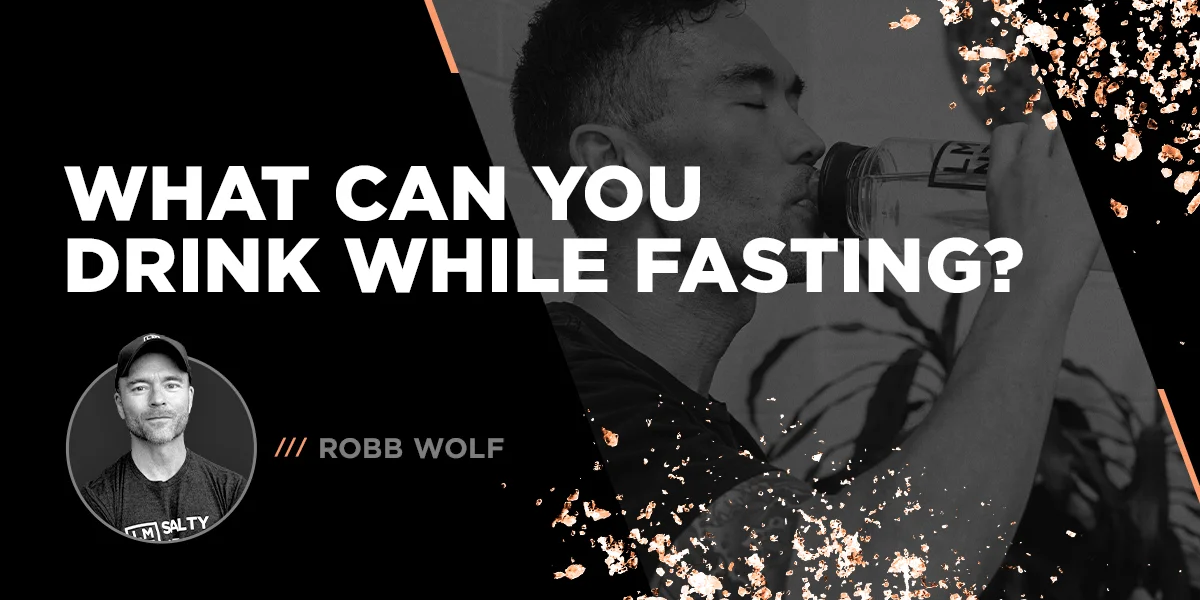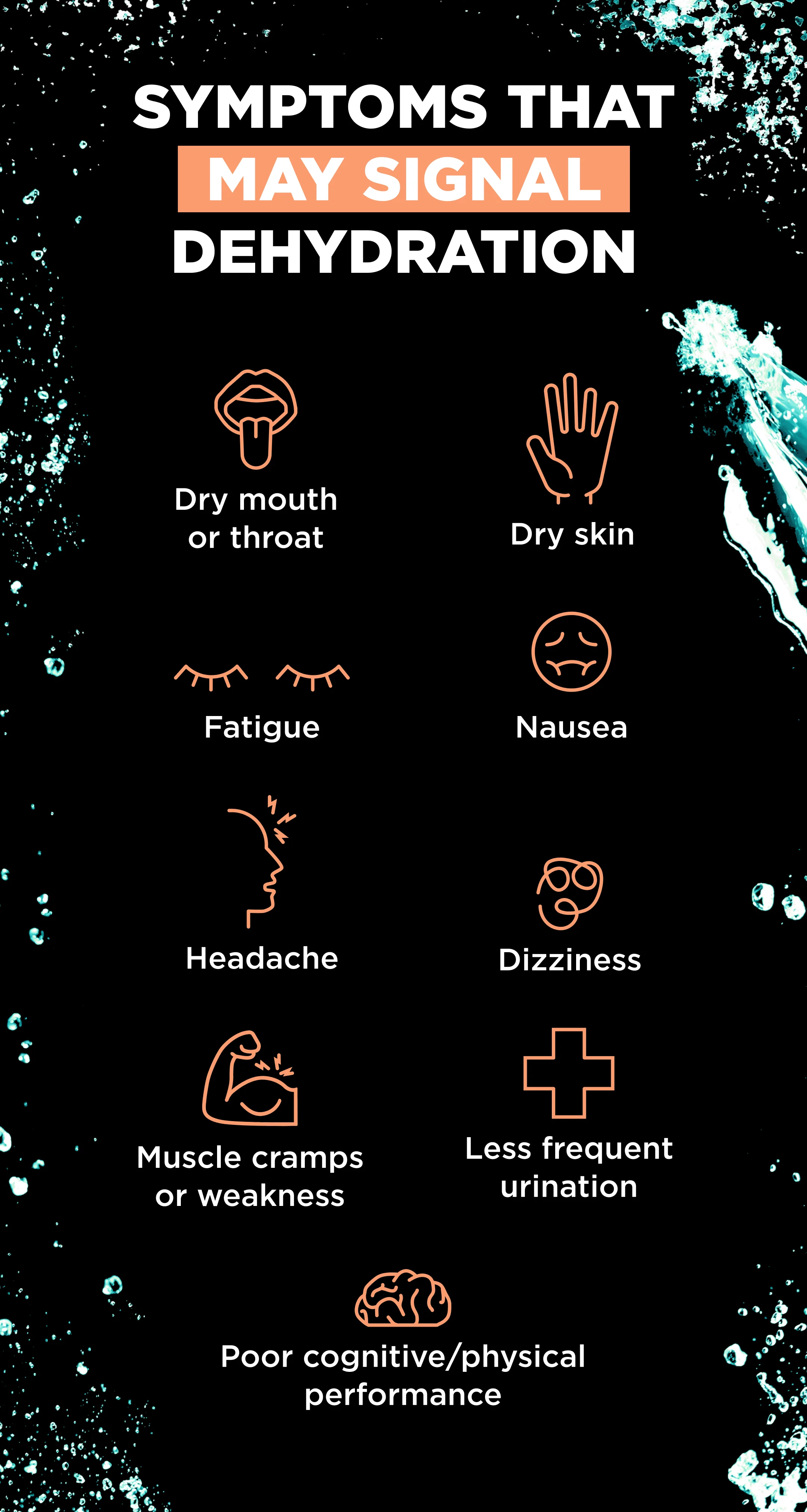
What can you drink while fasting?
Written by Robb Wolf (opens in a new tab)
<p>When people ask me what to drink while fasting, I have a simple response: <strong>non-caloric beverages. </strong></p><p>This three-word answer handles most FAQs. Does coffee break a fast? No, coffee has no calories. Tea? Diet soda? Ditto.</p><p>When I have more time to explain, though, I like to share the context behind that answer. Calories break a fast, yes, but the <em>dose</em> and <em>type</em> of calories matter. Consuming a few calories from adding a splash of creamer, collagen, or MCT oil to your morning brew won’t meaningfully affect your blood sugar and insulin levels or kick your body out of “fasting mode.”</p><p>You’ll want to drink <em>something</em> while you fast, anyways. Your body <a href="https://www.sciencedirect.com/science/article/abs/pii/0002934371901525" rel="noopener noreferrer" target="_blank">excretes water</a> at a more rapid rate when fasting, so it makes sense to listen to your thirst signals and drink enough. But many folks don’t know that fasting also excretes electrolytes (<a href="https://www.sciencedirect.com/science/article/abs/pii/0002934371901525" rel="noopener noreferrer" target="_blank">especially sodium</a>) at a faster rate, too — meaning including electrolytes in your water can make a positive impact on how you feel during a fast.</p><p>All that’s just the elevator spiel, though. Let’s dig deeper into the mechanics of fasting, what breaks a fast, and what you can and can’t drink while fasting for best results (skip here for that information if you’d like).</p>

<h2><strong>Fasting Basics</strong></h2><p>To understand how fasting works (and why eating “breaks” it), let me first share a bit about eating. Eating supports “growth” processes in our bodies — cell growth, muscle growth, tissue development and repair, etc. These processes are supported by some key hormones and enzymes, including:</p><ol><li>Insulin, which is a hormone released when we eat carbohydrates in particular. Insulin helps store energy in cells, and promotes cell growth and repair.</li><li>mTor, which is an enzyme expressed when we eat protein in particular. <a href="https://pmc.ncbi.nlm.nih.gov/articles/PMC5394987/" rel="noopener noreferrer" target="_blank">mTor</a> supports muscle and tissue growth. Important to note, it also blocks autophagy (a process that breaks down and recycles damaged cells).</li></ol><p>In tangible terms, these growth processes help us build bone, repair muscle tissue after a workout, and store energy for later use, among many other benefits!</p><p>However, it’s not beneficial to always be in a state of growth — <a href="https://pmc.ncbi.nlm.nih.gov/articles/PMC1204764/" rel="noopener noreferrer" target="_blank">insulin stores fat</a>, and perpetually high insulin can lead to type 2 diabetes. Dysregulation of mTor, on the other hand, is linked to <a href="https://pmc.ncbi.nlm.nih.gov/articles/PMC8317948/" rel="noopener noreferrer" target="_blank">aging and disease</a>.</p><p>This is where fasting comes in. When you don’t eat for <a href="https://pmc.ncbi.nlm.nih.gov/articles/PMC10594936/" rel="noopener noreferrer" target="_blank">greater than 12–14+ hours</a>, you don’t release insulin or express mTor, and your body downregulates these growth processes. Instead, <a href="https://science.drinklmnt.com/fasting/benefits-of-fasting/?" rel="noopener noreferrer" target="_blank">benefits</a> like autophagy ramp up, blood sugar and blood pressure can stabilize, fat is burned for energy (leading to <a href="https://science.drinklmnt.com/fasting/minimize-weight-gain-after-a-fast/" rel="noopener noreferrer" target="_blank">weight loss</a>), and more.</p><p>With insulin and mTor in mind, it’s now easier to understand what breaks a fast.</p><h2><strong>What Breaks A Fast?</strong></h2><p>Calories, especially larger doses of carbohydrates and protein, break a fast because they trigger insulin and mTor, which suppresses fasting’s benefits.</p><p>Carbs raise insulin the most. When you eat carbs, you digest those carbs into sugar, your blood sugar rises, and your pancreas releases insulin to store excess blood sugar in muscle, liver, and fat cells. Protein and fat can increase insulin too, but fat has the smallest effect.</p><p>Protein, on the other hand, activates mTor — most predominantly the amino acid <a href="https://pubmed.ncbi.nlm.nih.gov/27053525/" rel="noopener noreferrer" target="_blank">leucine</a>. Leucine is common in some protein sources like fish and eggs, but low in other proteins like collagen.</p><p>So the takeaway is to avoid carbs and leucine-rich protein while fasting to keep growth pathways suppressed. You can check out this article on<a href="https://science.drinklmnt.com/fasting/what-breaks-a-fast/" rel="noopener noreferrer" target="_blank"> what breaks a fast</a> to go deeper. </p><p>But this article is on what to drink while fasting. So with this context out of the way, let’s jump into that.</p><h2><strong>What To Drink While Fasting </strong></h2><p>While water’s a no-brainer to consume while fasting, it isn’t the only non-caloric drink available. Electrolytes, coffee, tea, and diet soda all make the list. Let me break down each individually and explain why.</p><h3><strong>Can I drink water while fasting?</strong></h3><p>You not only can, but you <em>should</em> in order to prevent symptoms of <a href="https://science.drinklmnt.com/electrolytes/dehydration-causes-and-symptoms/" rel="noopener noreferrer" target="_blank">dehydration</a>, especially since the body <a href="https://www.sciencedirect.com/science/article/abs/pii/0002934371901525" rel="noopener noreferrer" target="_blank">excretes more water</a> while fasting. Just <a href="https://science.drinklmnt.com/did-you-know/can-you-drink-too-much-water/" rel="noopener noreferrer" target="_blank">don’t overdo it</a>, listen to your body’s signals, and drink to thirst. This’ll keep most folks in the Goldilocks range of the “just right” amount of fluids.</p><h3><strong>Can I drink electrolyte water while fasting?</strong></h3><p>Absolutely. Especially since the body not only excretes more water during a fast, but excretes more electrolytes, too (<a href="https://www.sciencedirect.com/science/article/abs/pii/0002934371901525" rel="noopener noreferrer" target="_blank">especially sodium</a>). Plus, you won’t be getting any electrolytes through food like you normally would — and these little minerals are <a href="https://science.drinklmnt.com/electrolytes/what-are-electrolytes/" rel="noopener noreferrer" target="_blank">essential</a> to many of the body’s processes.</p><p>You’ll just want to be careful to read the labels. Some electrolyte drinks include quite a bit of sugar. Others contain only a few to zero calories, and shouldn’t disrupt the fast (though you can always confirm how your body responds by using a Continuous Glucose Monitor).</p><p><a href="https://drinklmnt.com/collections/salt/" rel="noopener noreferrer" target="_blank">LMNT</a> will not break your fast, either; LMNT contains so few calories that many folks in our community have shared that they don't experience any blood sugar increase when drinking LMNT. Since health is highly individual, we encourage you to test that yourself. If you prefer to avoid all calories during a fast, <a href="https://drinklmnt.com/products/lmnt-recharge-electrolyte-drink?variant=16358367232034" rel="noopener noreferrer" target="_blank">LMNT Raw Unflavored</a> drink mix contains zero calories — it's just sodium, potassium, and magnesium.</p><p>There is a LOT of nuance to all this which is why I put together the talk "<a href="https://youtu.be/YaW_YltdwzI?si=2YjCuD80Q3JCMVCG" rel="noopener noreferrer" target="_blank">Longevity: Are We Trying Too Hard</a>?”</p><h3><strong>Can I drink coffee while fasting? </strong></h3><p>Go for it. Most brews only contain a calorie or two at most, plus coffee contains loads of antioxidants and may <a href="https://pubmed.ncbi.nlm.nih.gov/24769862/" rel="noopener noreferrer" target="_blank">enhance autophagy</a>. A little fat or collagen in your brew is okay for most folks, but skip the sugar.</p><p>One small caveat however: Oddly enough, fasting itself acts as a stimulant, at least in the earlier stages. Many find their caffeine tolerance dramatically changes while fasting. An insignificant amount of coffee under normal circumstances can leave one stuck to the ceiling while fasting. You may want to start with about half the dose you normally consume, give it some time, and then adjust from there. </p><h3><strong>Can I drink tea while fasting? </strong></h3><p>Yep, same principle as coffee. No calories here, plus lots of antioxidants.</p><h3><strong>Can I drink diet soda while fasting? </strong></h3><p>Yes, but consider a zero-calorie soda sweetened with<a href="https://drinklmnt.com/blogs/health/what-is-stevia-and-is-it-healthy" rel="noopener noreferrer" target="_blank"> stevia</a> or monk fruit. Artificial<a href="https://drinklmnt.com/blogs/health/12-popular-sugar-substitutes" rel="noopener noreferrer" target="_blank"> sweeteners</a> like aspartame and sucralose may<a href="https://pubmed.ncbi.nlm.nih.gov/34063332/" rel="noopener noreferrer" target="_blank"> negatively affect gut bacteria</a>.</p><h3><strong>Can I drink bone broth while fasting? </strong></h3><p>A mug or two of bone broth won’t meaningfully disrupt your fast. While they contain protein, they’re both low in leucine, helping mTor stay low. Same with collagen. That said, they won’t enhance your fast, either.</p><h2><strong>What Not To Drink While Fasting</strong></h2><p>Calories hide in a lot of common beverages, so before I wrap up I’ll end with a quick list of drinks to avoid to help keep your body in fasting mode.</p><ul><li>Regular soda</li><li>Fruit juice (even with “no sugar added” — fruit and fruit juices contains lots of natural sugar)</li><li>Sugary sports drinks</li><li>Milk, chocolate milk, and hot chocolate</li><li>Smoothies</li><li>Protein drinks</li><li>Alcoholic beverages</li><li>Most latte, cappuccino, mochaccino, and frappuccino drinks</li></ul><h2><strong>A Simple Framework</strong></h2><p>I hear it all the time. <em>Can I drink X on fast?</em> </p><p>You can solve for X without frantic Googling when you understand how fasting works. If it’s low in calories, carbs, and leucine, it’s likely fasting-friendly. If it’s not, it’s not. It really is that simple.</p><p>When in doubt, test it out. A Continuous Glucose Monitor or at-home finger prick test can show whether your blood sugar increases after testing a certain drink. Or just stick to water and electrolytes to help keep you hydrated throughout the day. Just make sure sugar doesn’t come along for the ride. Happy fasting. </p>
